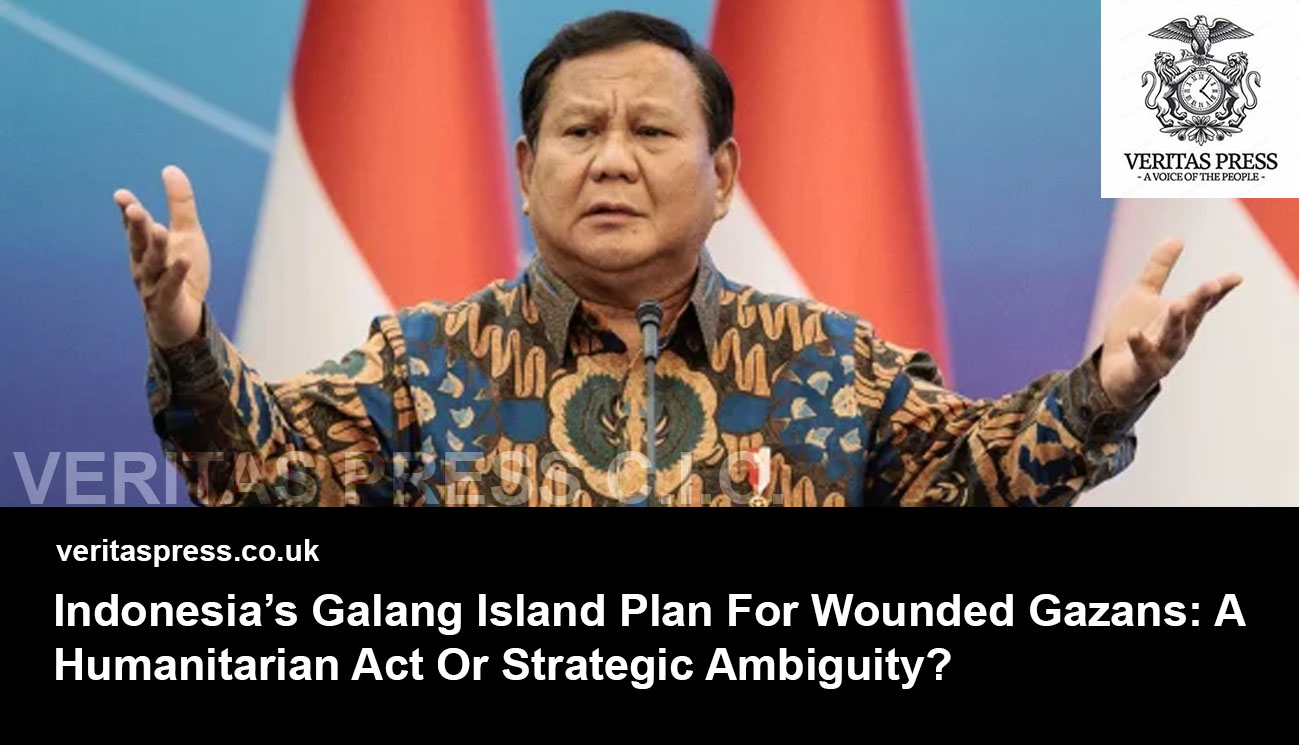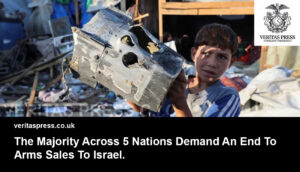Press Release: Veritas Press C.I.C.
Author: Kamran Faqir
Article Date Published: 07 Aug 2025 at 11:07 GMT
Category: Southeast Asia-Oceania | Politics | Indonesia
Source(s): Veritas Press C.I.C. | Multi News Agencies
Indonesia has announced an ambitious humanitarian plan to treat up to 2,000 wounded Palestinians from Gaza on its uninhabited Galang Island, a move that has drawn both praise and sharp scrutiny amid ongoing genocide allegations against Israel and global debates about the forced displacement of Palestinians.
Presidential spokesperson Hasan Nasbi confirmed on Thursday that Indonesia will repurpose a medical facility on Galang Island, located south of Singapore and off the coast of Sumatra, to care for Palestinians injured in Israel’s relentless military assault on Gaza. Patients will be returned to Gaza once they recover, Nasbi said, stressing that this is “not an evacuation.”
“This is medical help for victims of war, those who are wounded, buried under debris. It is not a resettlement,” Nasbi told reporters, responding to renewed concerns that Indonesia may be wading into the politically and morally fraught waters of Palestinian displacement.
A Controversial Move Amid A Catastrophic War:
The initiative arrives as Gaza reels from ten months of near-continuous Israeli bombardment and siege. According to health authorities in Gaza, more than 100,000 Palestinians, mostly civilians, have been killed since Israel began its military offensive in October 2023. Hunger, disease, and widespread infrastructure collapse have exacerbated the suffering, and aid groups have repeatedly accused Israel of obstructing relief.
The United Nations has warned of deliberate starvation tactics being employed in Gaza, with humanitarian access restricted, hospitals bombed, and clean water systems destroyed. Images from Khan Younis just days ago showed Palestinians scrambling for food from charity kitchens, amid what the World Health Organisation now calls a full-scale famine.
Against this backdrop, Indonesia’s offer of temporary medical refuge could provide desperately needed relief to a small number of victims. But the move also raises questions about political optics, historical precedent, and the blurred lines between humanitarian aid and strategic diplomacy.
Galang Island: A Site Of Refuge And Controversy.
Galang Island itself carries a complex legacy. It was once a sprawling UN-run refugee camp for over 250,000 Vietnamese asylum seekers in the aftermath of the Vietnam War. More recently, the Indonesian government built a COVID-19 hospital there in 2020, which will now be refurbished for the Palestinian mission.
The site is currently uninhabited, and Indonesian officials have indicated that the patients’ families may also be temporarily accommodated during the treatment period. No timeline has been provided, and both the foreign and defence ministries have yet to issue further details.
Still, critics argue that the lack of clarity over logistics and legal protections for these patients and their families, particularly their guaranteed return to Gaza, leaves the plan vulnerable to political manipulation.
Echoes Of Trump-Era Displacement Proposals:
The announcement follows earlier controversy surrounding President Prabowo Subianto’s remarks earlier this year, offering to host wounded Palestinians in Indonesia. That offer drew fierce criticism from senior Indonesian Islamic clerics, who warned it dangerously echoed former U.S. President Donald Trump’s proposal to resettle Palestinians outside Gaza permanently, widely seen as a bid to normalise ethnic cleansing under the guise of humanitarianism.
Indonesia’s Foreign Ministry quickly distanced itself from such implications, reaffirming that it “strongly rejects any attempt to forcibly displace Palestinians” and reiterating support for a two-state solution in line with international law.
Yet the controversy remains unresolved. Israeli media outlets and Western pro-Israel voices have seized upon Indonesia’s humanitarian initiatives to argue that Arab and Muslim nations are willing to remove Palestinians from Gaza, a narrative Palestinians themselves have condemned as deeply dehumanising and politically dishonest.
Jakarta Post Editorial: Indonesia Must Speak Boldly
An editorial in The Jakarta Post published Thursday called on President Prabowo to use his upcoming address at the United Nations General Assembly next month to firmly assert Indonesia’s position—not just as a humanitarian actor, but as a principled advocate for Palestinian self-determination.
“It is not enough to send rice or run hospitals,” the editorial reads. “The world does not need another lukewarm call for peace or vague endorsement of a two-state solution. It needs a firm statement of principles: that Indonesia opposes the ongoing displacement of Palestinians, rejects any normalisation of ties with Israel while the occupation continues, and supports Palestinian statehood as an urgent, non-negotiable priority.”
The editorial also cautioned against Indonesia’s recent diplomatic language aligning with Western narratives, including the country’s support for a UN statement condemning the Hamas-led attack of October 7. While condemning attacks on civilians is a tenet of international humanitarian law, critics say this selective condemnation risks legitimising the asymmetry of violence and occupation in the region.
The Domestic Pressure And The Global Shift:
Public support for Palestine remains overwhelmingly strong in Indonesia. Mass rallies in Jakarta and other cities continue to draw tens of thousands of demonstrators. Civil society groups have been vocal in demanding clarity from the government and action beyond symbolic gestures.
This pressure comes at a time when even some of Israel’s staunchest allies, France, Ireland, Norway, Spain, Canada, and the UK, have taken steps toward recognising a Palestinian state. For many Indonesians, this marks a historic shift, one that their country, with its proud anti-colonial legacy, should lead rather than follow.
Instead, some critics fear that Indonesia’s bid to join the OECD and its desire to deepen ties with Western partners may be prompting a more cautious, less confrontational foreign policy, at odds with its past leadership on the Palestinian issue.
A Call For Moral Leadership:
Indonesia’s Galang Island initiative can be read in multiple ways: as a life-saving humanitarian act, a gesture of solidarity with a besieged people, or a carefully calculated move to maintain regional and international goodwill without upsetting powerful Western capitals.
But in the eyes of many, its ultimate meaning will be determined not by the number of patients treated or the tonnage of rice sent, but by whether Indonesia is willing to speak clearly and forcefully about the root causes of the Palestinian tragedy, military occupation, apartheid, and ethnic cleansing.
President Prabowo now faces a crucial test. His upcoming UN address is not merely an opportunity for diplomacy; it is a moment to reassert Indonesia’s moral compass on the global stage.
“There is no solution that involves the forced removal of Palestinians,” concluded The Jakarta Post. “No humanitarian gesture can justify ethnic cleansing. The world is shifting, Indonesia must lead, not whisper from the sidelines.”
In Summary: Humanitarian Cloak, Political Risks.
Indonesia’s plan to treat 2,000 wounded Palestinians on Galang Island is undeniably rooted in humanitarian concern. But stripped of its careful diplomacy and vague timelines, the initiative raises hard questions about motive, message, and moral clarity.
For a nation that once led the Global South in championing decolonisation and self-determination, Indonesia now risks being complicit in a disturbing shift, from confronting injustice to managing its consequences. The language of “temporary refuge” and “medical treatment” must not obscure the uncomfortable fact: at a time when Israel stands accused of genocide, even well-intentioned humanitarian actions can be twisted into tools of ethnic cleansing if they help normalise the removal of Palestinians from their homeland.
President Prabowo’s earlier comments, coupled with a lack of transparency on the Galang Island plan, have already been exploited by Israeli media to frame Indonesia as a willing partner in Gaza’s depopulation. This narrative, if left unchallenged, could contribute to legitimising what many international legal scholars now call a slow-motion forced transfer, a war crime under international law.
Humanitarian aid must never be used to launder war crimes. Yet by sidestepping the structural roots of Palestinian suffering, military occupation, apartheid policies, and decades of enforced displacement, Indonesia risks offering a humanitarian fig leaf to a system of brutal oppression. Galang Island may save lives, but it must not serve as a test balloon for the ethnic resettlement of Palestinians under the guise of care.
At minimum, the Indonesian government must make its red lines unmistakable: no permanent relocation, no normalisation, no silence on war crimes. It must use every diplomatic forum—not just the UN General Assembly, but also the Organisation of Islamic Cooperation, the Non-Aligned Movement, and ASEAN, to demand an immediate ceasefire, an end to the blockade, and full recognition of Palestinian sovereignty.
Anything less is not neutrality. It is abandonment.
Indonesia cannot afford to hedge. In this moment of global realignment, silence is complicity, and gestures without principles are not diplomacy. They are surrendering.




























Leave a Reply